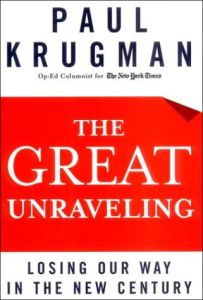
The Great Unraveling
Losing Our Way in the New Century
Read or listen offline
Recommendation
This powerful indictment of President George W. Bush’s administration comes from a prize-winning economist and journalist. Even if author Paul Krugman’s stiffest critics would not argue with the facts in his New York Times columns, they would argue mightily about his interpretations. Since the administration’s story is still unfolding, the net effect of Bush’s economic, political and managerial decisions have not been felt fully. When they are, Krugman contends in columns published from January 2000 to January 2003, the U.S. will face dramatically higher inflation and a host of economic woes. He blames Bush for creating the moral climate that enabled the recent corporate scandals. Krugman asks passionately why Bush has lied consistently to the public about the budget, the war and even the real goal of his administration, and gotten away with it. He itemizes a list of administration lies and misuse of information. He contends that Bush’s real aim is to unravel the welfare state, reduce taxes and help the wealthy. While some columns are dated, most seem remarkably fresh, so fresh that it is too soon for a final conclusion about many of these predictions. getAbstract.com thinks this is required reading for anyone interested in politics or the U.S. economy, whether Krugman’s take on Bush will please you or infuriate you.
Take-Aways
About the Author
Paul Krugman writes a column twice a week for the op-ed page of The New York Times and teaches at Princeton University. He won the John Bates Clark medal as the best American economist under the age of 40.



















Comment on this summary or Start Discussion